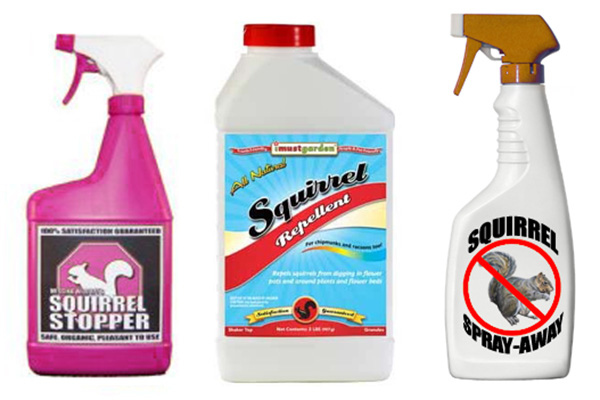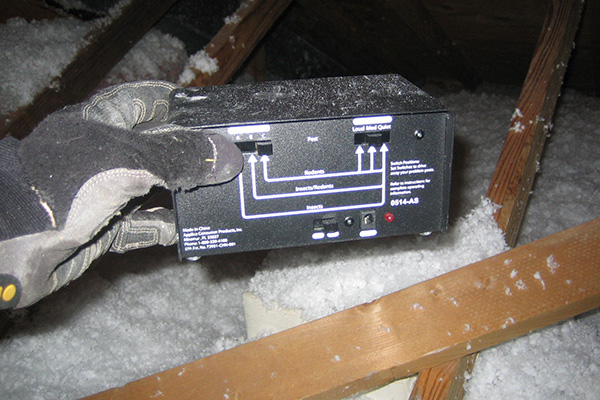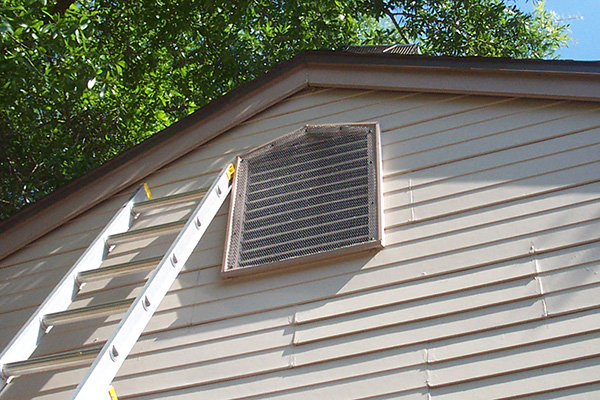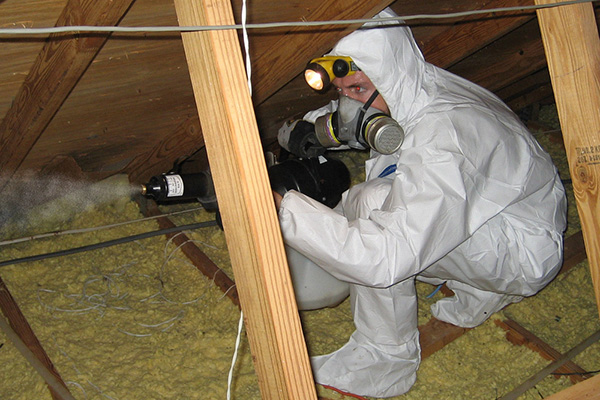- info@animalatticpest.com
- Call - we service 300 locations

Squirrel Repellent for Attic - Deterrent Products and Devices
When it comes to powders, granules, sprays and stuff you can buy at Home Depot or online, in my 15+ years as a wildlife removal professional, I have seen it all: attics filled with strobing lights, blaring radios, ultrasonic sound machines, and every
type of over-the-counter repellent, from coyote urine flakes, to ammonia, to the end-all-be-all el cheapo scam, mothballs. I once went into an attic in which a desperate old lady had dumped close to 100 lbs. of mothballs
in her attic. The squirrels didn't care! Here's the problem with repellents in general: once a squirrel lives in your attic, and has a nest of babies there, that's it. That's the only option for survival. There is no
device, no repellent that will make them leave. Go ahead and buy a squirrel repellent at Home Depot, or a squirrel deterrent device online - waste your time. But they have zero demonstrated effectiveness.
However, if you want to keep squirrels out of your attic, there's a GREAT repellent - home repair products! Heavy-gague steel mesh, metal flashing, and other repair materials which are resistant to squirrel chewing. Inspect
the house to find the entry holes, and seal them shut. 100% guaranteed repellent! But if you already have squirrels in your attic, there's no product or device that will make them leave. Luckily, the problem is just as
easy to solve with repairs and exclusion doors as it is with a applying a repellent. Do it the right way and get your squirrel problem solved.
There is one exception: sometimes raccoon eviction fluid, which is the scent of a male raccoon, can make squirrels in tight quarters leave and bring their young with them. But it doesn't always work, and it's harder to
use than just doing it the right way, so I don't use REV on squirrels.
Squirrel Repellent - Deterrent Products and Devices
1 - Squirrel Repellent Products
A gimmick meant to take your money, but worst of all, waste your time. These won't solve the problem, which will only get worse while you wait.
High Pitch Sound Machine
These products are sold everywhere, and emit high-frequency sound. They are so fraudulent the FTC has issued an official warning about them as a consumer product.
Repairs - True Repellent!
Buy some proper materials and seal shut the entry holes, with professional grade repairs, and that's the most effective repellent you can buy!
Clean the Attic
The scent of squirrels that have already lived in your attic will attract new squirrels. The phermones in the feces, urine, etc. Cleaning is good repellent.
Squirrel Repellent Reviews
Mothballs: 0/5 STARS Mothballs or mothball flakes, sometimes mixed with coyote urine or other ingredients, is the most common repellent - cheap to make. But zero effectiveness on squirrel
behavior. And a known environmental toxin and carcinogen to boot! Wow! That's my mothball squirrel repellent review.
Ammonia: 0/5 STARS Ammonia has a strong odor, like mothballs. But in an attic, which is ventilated, the smell just kind of wafts away. And a mother squirrel isn't going to abandon her
young just because of a light odor! C'mon.
Strobing Lights: 0/5 STARS These flashing light machines for squirrels are commonly sold by enthusiastic marketers, but I've been in attics with several of these installed, and the squirrels
don't care. They can easily go do dark areas, down in eaves and soffits, or behind beams and insulation. Or maybe they just don't care about flashing lights at all. They don't work. That's my flashing light squirrel repellent review.
Sound Machines / Radio: 0/5 STARS Same as with the lights or the odor, they are able to go to places in the attic where the effect is less, and/or they just don't care. A squirrel is not going
to let her young die just because of a sound or light or smell! That's my sound machine squirrel repellent review - but you don't have to take my word for it. Look up what the FTC has to say about these fraudulent devices.
Raccoon Eviction Fluid: 1/5 STARS In special circumstances, this can work. Like if you can isolate the squirres to one area, or apply right on the nest, maybe it'll work. But in my opinion,
this is just as hard as trapping and exclusion, so why bother? Do it the right way!
Hot Sauce: 1/5 STARS Super hot sauce, like police-grade mace, can prevent them from chewing on wood or plants, if applied directly via spray or basting on with a paintbrush. It can be an effective chew repellent,
but it's not an overall effective squirrel deterrent.
Home Repairs: 5/5 STARS Bravo! The winner! Just find the entry holes the squirrels are using to get into your house, seal them shut with metal repairs, and you have a 100% effective, PERMANENT squirrel
repellent solution.
Information About Squirrel Repellents
SQUIRREL REPELLENT - Squirrels can be really annoying creatures and it is no surprise that many different types of squirrel repellents exist and are sold in stores. Some homeowners even make their own home-made repellents to ward off the pesky pests. Unfortunately though, these touted solutions rarely work and people most of the time, still resort to trapping after spending money on repellents.
Chemical repellents are usually sold in liquid and granular form in stores. In actual fact, repellents rarely get the job done and there is no proven one, but those that contain the active ingredient – Capsaicin, are more likely to be effective. Generally speaking, repellents works better with small infestations and the pests have not caused any widespread or serious damage.
Liquid-based repellents
Some of them incorporate predator urine (fox or coyote) as a basic ingredient; likewise Capsaicin, a taste deterrent that is believed to repel squirrels. In applying repellents, consistency and patience are important, they must be reapplied as directed to maintain their repellency. Liquid repellents can be sprayed on surfaces, bird feeders, roofing, trash cans, flowers, and even trees, to discourage squirrels from chewing or digging.
Granule-based repellents
They basically contain the same components and their granular form makes them suitable for indoor use, even below 40 degrees. Granular repellents can be sprinkled on flowerbeds, crawl spaces, tree bases, attics, around gardens and house perimeters. Some farmers and gardeners use the granules to build a repelling barrier around planted bulbs and seeds in gardens.
Electronic repellents
These are actually more suited to bigger critters but can be used as a backup defense against the smaller squirrels. Motion-activated sprinklers are placed out in the yard and when activated by an inbuilt motion sensor, would startle any animal that passes with a burst of water. This chemical-free option is meant to startle them into running away. Use the highest sensitivity setting for squirrels because of their small size.
There is also the ultrasonic squirrel repellent that employs electromagnetic waves, ultrasonic and sonic waves, as well as UV (ultraviolet) rays to deter animals. Some of these machines produce a squirrel repellent sound, sound waves that cannot be heard by humans but is irritating to the squirrel.
Homemade Natural Remedies
1. Predator urine: it has little to no chance of being effective even when it is sourced directly – that is, if you can figure out how to do that. The squirrel’s natural predators include bobcats, coyotes and foxes. They are mostly found in store-bought preparations.
2. Garlic and pepper: mashed together in water and vinegar and poured in a spray bottle. Some homeowners swear by this home-made preparation
3. Hot chili pepper ground into powder and sprinkled on the squirrel’s damage areas can also be deterring for the pest.
4. Moth balls – they are believed to make such a bad smell that the animal is irritated and can't stand to live in the area. They are usually placed in attics to try to deter squirrels from nesting there, but as discussed, a squirrel isn't going to let its young die just because of an odor.
Note: It is important that you study your squirrel’s behavior patterns and nest locations well enough before deciding which repelling solution to employ. Chemical repellents need to re-applied every couple of days, especially after a rain. Electronic repellents on the other hand require little maintenance in addition to being eco-friendly. In order to increase your chances of success at repelling squirrels, you may combine more than one repelling solution. You should also watch the timing of your repelling effort. Learn about the hibernation habits of the squirrels in your locality and plan around it.
Although many of these repellent solutions may yield some level of effectiveness, squirrels and indeed other wildlife always get accustomed to, or find a way around them eventually. The struggle for survival is real for these animals and they are not easily deterred especially when a food source is at stake.
The only way to successfully deter squirrels from your property is to practice exclusion and ensure that you are not feeding them. If you already have a squirrel house guest, humanely remove them and carry out repairs to block all entry points to your property. To this end, you may want to hire a wildlife professional to proof your house against invasion by squirrels and other wandering wildlife.
The Bottom Line
Do squirrel repellents work at getting them out of the attic? NO! Luckily, the problem is just as easy to solve with repairs and exclusion doors as it is with a applying an attic repellent. Do it the right way and get your squirrel problem solved.




